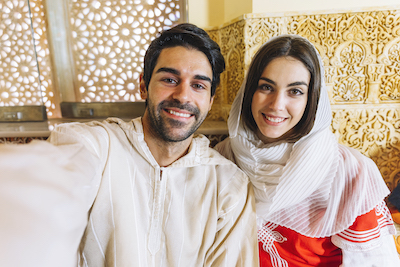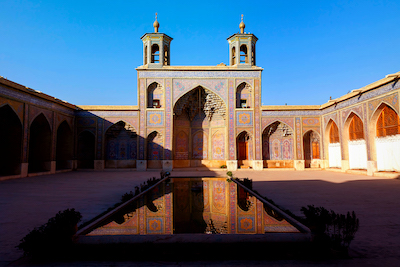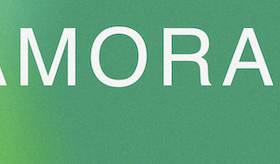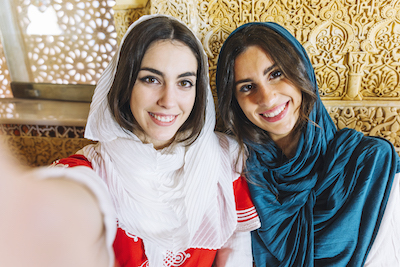Iranian dating culture, or Persian dating as they’d like to say, is about as intricate as a poem from Hafez or Rumi. Persian dating culture is deeply rooted in their colorful history.
Truthfully, dating culture in Iran is significantly different from that of Western countries. In Iran, dating is not considered to be a casual activity and is often viewed as a serious commitment that leads to marriage. This is largely due to the fact that Iran is a predominantly Muslim country and Islamic beliefs heavily influence social norms and behaviors.
When discussing Persian dating culture, it is important to keep context in mind. There is the mainstream Iranian culture, which is heavily influenced by political powers and then there is the underground Persian culture. Though dating in Iran is not entirely restricted, per se, it is not a commonly understood or supported topic. Casual relationships do occur in Iran, but in general they are out of the public eye. People may meet at an underground party, near a university or through some other means like social media.
In Iran more formal relationships, usually start with a formal proposal, known as khastegari. This process involves the man expressing his interest in the woman to her family and seeking their approval. If the family approves, the couple can then begin to get to know each other better, with the presence of a chaperone during early meetings being common.
Physical contact between unmarried couples, including holding hands or kissing, is considered inappropriate and can be met with disapproval or even punishment. In some cases, the couple may be reported to the authorities and face legal consequences.

The concept of dating is starting to shift in Iran, with younger generations of Persians becoming more open to the idea of casual dating and relationships. This is largely due to the influence of Western culture, which has become more accessible through the internet and social media. However, this shift is still limited to a small section of society, and most Iranians continue to adhere to traditional dating practices. For those who meet in private and who may use dating apps or websites to connect with must do so discreetly to avoid scrutiny from their families and society.
Overall, dating in Iran is heavily influenced by cultural and religious beliefs, with formal proposals, chaperones, and a focus on marriage being the norm. While there are some signs of change, these traditions continue to play a significant role in Iranian society.
8 interesting facts about Persian dating culture
- Dating is not officially recognized: Dating is not officially recognized in Iran, as it is forbidden by Islamic law. However, many young Persians still date covertly and often rely on introductions from family and friends to meet potential partners.
- Pre-marital sex is taboo: Pre-marital sex is considered taboo in Iran and can lead to harsh punishment, including imprisonment. As a result, many couples may choose to marry quickly to avoid any potential consequences.
- Traditional gender roles are prevalent: Traditional gender roles are still very prevalent in Iranian dating culture. Men are expected to be providers, while women are expected to be caretakers.
- Chaperoning is common: In traditional families, chaperoning is common during the early stages of a relationship. This means that a third person, often a family member, accompanies the couple on dates.
- Weddings are lavish affairs: Weddings in Iran are extravagant affairs, often lasting several days. Families spare no expense to ensure that their children have the most lavish and memorable wedding possible.
- Matchmaking is still popular: Matchmaking is still a popular way for young people to meet potential partners in Iran. This is often done through family members, friends, or professional matchmakers.
- The engagement period is lengthy: The engagement period in Iran can be lengthy, lasting up to a year or more. During this time, the couple is expected to get to know each other and their families.
- Divorce is frowned upon: Divorce is still considered taboo in Iran, and many couples will go to great lengths to avoid it. Counseling and mediation are often used to help couples work through their issues and stay together.
Most Romantic Day in Iran
In Iran, the most romantic day is called Esfandegan or Sepandarmazgan, which falls on February 17th in the Gregorian calendar. This holiday is dedicated to love and friendship, and people typically exchange gifts and cards to express their affection for one another.
Typical First Date in Iran
In Iran, traditional gender roles and cultural norms still heavily influence the dating scene. Dating is not openly discussed or encouraged, and unmarried couples are expected to be discreet in their interactions.
However, should a potential couple decide to meet, a first date in Iran will involve meeting in a public place, such as a coffee shop or park, with the intention of getting to know each other in a low-pressure environment. Physical contact between unmarried couples is generally discouraged, so hand-holding or other forms of affection are rare. During the date, the couple may discuss their backgrounds, interests, and goals for the future. In Iran, it’s also common for a couple’s families to be involved in the courtship process, so a first date may also include meeting each other’s parents or family members.
Is Iran gay friendly?
No, Iran is not considered to be gay-friendly. Homosexuality is illegal and carries severe punishment under Iranian law. Same-sex sexual activity is punishable by imprisonment, corporal punishment, or even the death penalty. The government of Iran does not recognize same-sex marriage, and LGBTQ+ individuals face widespread discrimination and social stigma.
Social cues and gender roles in Iran
As we’ve discussed so far, the concept of dating is not as common as it is in Western cultures. The traditional Iranian dating culture is based on different principles and has its own set of rules. Generally, young people in Iran meet each other through family introductions or mutual friends, and they may engage in brief conversations to see if there is mutual interest. In this sense, dating in Iran is often more like courtship.

When it comes to gender norms in dating in Iran, there are certain expectations placed on both men and women. For example, men are expected to be financially stable and able to support a family, while women are expected to be chaste and modest. Traditional gender roles are also emphasized, with men often taking the lead in pursuing women and planning the date.
Additionally, public displays of affection are not common in Iran, and couples are expected to be discreet and respectful of cultural norms. It is also important to note that premarital sex is illegal in Iran, which further shapes the expectations and behaviors around dating.
Top dating apps in Iran
The use of dating apps and/or online dating in Iran is interesting. Technically, access to many Western dating apps, including Tinder and Bumble, is blocked in Iran due to government censorship. Further, Google Play Store and App Store are quite limited in the market so it is not possible to even download these apps. Android users find workarounds by using tertiary markets such as Cafe Bazaar and the use of VPNs; but this may not be common knowledge to the average Iranian. That being said, there are some locally developed dating apps or websites that have varying degrees of popularity in Iran, including:
- Delbara: This is a dating app developed by an Iranian company that targets the Persian-speaking community around the world. The app has features such as messaging, video chat, and advanced search options.
- Hamsan: Another popular dating app in Iran is Hamsan, which means “companion” in Persian. This app allows users to create a profile, browse other profiles, and send messages. It also has a feature called “Secret Chat,” which allows users to send messages that disappear after a set amount of time.
- Go Iranian: Go Iranian is a dating app that targets Iranian singles worldwide. It has features such as chat, video calls, and a matchmaking algorithm that suggests potential matches based on users’ preferences.
- Chetori: Chetori is a Persian dating app that was created by an Iranian-American entrepreneur. It is designed to be a platform for Iranian singles to connect with each other and find potential partners.
It’s important to note that online dating and dating apps are not as widely accepted in Iran as they are in Western countries. Many Iranians still prefer to meet potential partners through family or friends, and there can be a social stigma attached to using dating apps.



